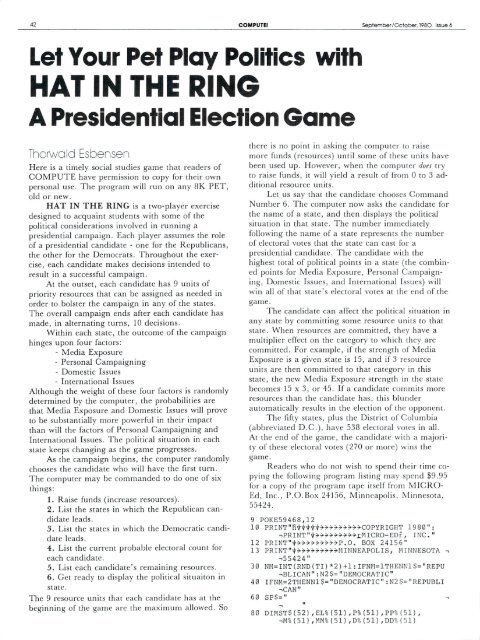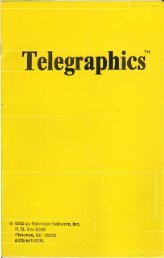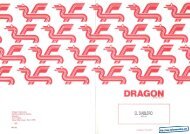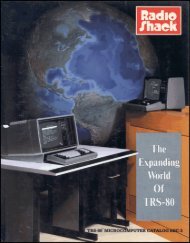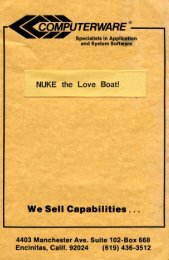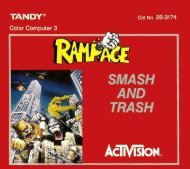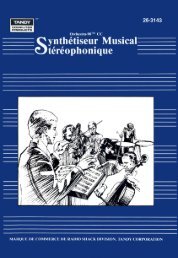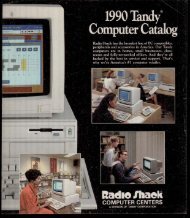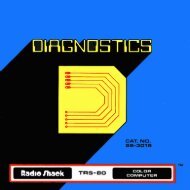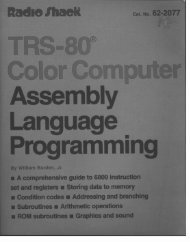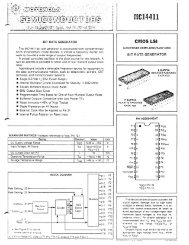The Resource Magazine For Apple, Atari, and Commodore ...
The Resource Magazine For Apple, Atari, and Commodore ...
The Resource Magazine For Apple, Atari, and Commodore ...
You also want an ePaper? Increase the reach of your titles
YUMPU automatically turns print PDFs into web optimized ePapers that Google loves.
42 COMPUTEI September/Octooer, 1980. Issue 6<br />
Let Your Pet Play Politics<br />
HAT IN THE RING<br />
with<br />
A Presidential Election Game<br />
Thorwald Esbensen<br />
Here is a timely social studies game that readers of<br />
COMPUTE have permission to copy for their own<br />
personal use. <strong>The</strong> program will run on any 8K PET,<br />
old or new.<br />
HAT IN THE RING is a two-player exercise<br />
designed to acquaint students with some of the<br />
political considerations involved in running a<br />
presidential campaign. Each player assumes the role<br />
of a presidential c<strong>and</strong>idate - one for the Republicans,<br />
the other for the Democrats. Throughout the exer<br />
cise, each c<strong>and</strong>idate makes decisions intended to<br />
result in a successful campaign.<br />
At the outset, each c<strong>and</strong>idate has 9 units of<br />
priority resources that can be assigned as needed in<br />
order to bolster the campaign in any of the states.<br />
<strong>The</strong> overall campaign ends after each c<strong>and</strong>idate has<br />
made, in alternating turns, 10 decisions.<br />
Within each state, the outcome of the campaign<br />
hinges upon four factors:<br />
- Media Exposure<br />
- Personal Campaigning<br />
- Domestic Issues<br />
- International Issues<br />
Although the weight of these four factors is r<strong>and</strong>omly<br />
determined by the computer, the probabilities are<br />
that Media Exposure <strong>and</strong> Domestic Issues will prove<br />
to be substantially more powerful in their impact<br />
than will the factors of Personal Campaigning <strong>and</strong><br />
International Issues. <strong>The</strong> political situation in each<br />
state keeps changing as the game progresses.<br />
As the campaign begins, the computer r<strong>and</strong>omly<br />
chooses the c<strong>and</strong>idate who will have the first turn.<br />
<strong>The</strong> computer may be comm<strong>and</strong>ed to do one of six<br />
things:<br />
1. Raise funds (increase resources).<br />
2. List the states in which the Republican can<br />
didate leads.<br />
3. List the states in which the Democratic c<strong>and</strong>i<br />
date leads.<br />
4. List the current probable electoral count for<br />
each c<strong>and</strong>idate.<br />
5. List each c<strong>and</strong>idate's remaining resources.<br />
6. Get ready to display the political situaiton in<br />
state.<br />
<strong>The</strong> 9 resource units that each c<strong>and</strong>idate has at the<br />
beginning of the game are the maximum allowed. So<br />
there is no point in asking the computer to raise<br />
more funds (resources) until some of these units have<br />
been used up. However, when the computer does try<br />
to raise funds, it will yield a result of from 0 to 3 ad<br />
ditional resource units.<br />
Let us say that the c<strong>and</strong>idate chooses Comm<strong>and</strong><br />
Number 6. <strong>The</strong> computer now asks the c<strong>and</strong>idate for<br />
the name of a state, <strong>and</strong> then displays the political<br />
situation in that state. <strong>The</strong> number immediately<br />
following the name of a state represents the number<br />
of electoral votes that the state can cast for a<br />
presidential c<strong>and</strong>idate. <strong>The</strong> c<strong>and</strong>idate with the<br />
highest total of political points in a state (the combin<br />
ed points for Media Exposure, Personal Campaign<br />
ing, Domestic Issues, <strong>and</strong> International Issues) will<br />
win all of that state's electoral votes at the end of the<br />
game.<br />
<strong>The</strong> c<strong>and</strong>idate can affect the political situation in<br />
any state by committing some resource units to that<br />
state. When resources are committed, they have a<br />
multiplier effect on the category to which they are<br />
committed. <strong>For</strong> example, if the strength o( Media<br />
Exposure is a given state is 15, <strong>and</strong> if 3 resource<br />
units are then committed to that category in this<br />
state, the new Media Exposure strength in the state<br />
becomes 15 x 3, or 45. If a c<strong>and</strong>idate commits more<br />
resources than the c<strong>and</strong>idate has, this blunder<br />
automatically results in the election of the opponent.<br />
<strong>The</strong> fifty states, plus the District of Columbia<br />
(abbreviated D.C.), have 538 electoral votes in all.<br />
At the end of the game, the c<strong>and</strong>idate with a majori<br />
ty of these electoral votes (270 or more) wins the<br />
game.<br />
Readers who do not wish to spend their time co<br />
pying the following program listing may spend $9.95<br />
for a copy of the program tape itself from MICRO-<br />
Ed, Inc., P.O.Box 24156, Minneapolis, Minnesota,<br />
55424.<br />
9 POKE59468,12<br />
10 1980":<br />
, INC. "<br />
12 PRINT"^»»»»»»»»P.O. BOX 24156"<br />
13 PRINT"^»»»»»»MINNEAPOLIS, MINNESOTA<br />
i55424"<br />
30 NM=INT(RND{TI)*2)+1:IFNM=1THENN1$="REPU<br />
-.BLICAN":N2$= "DEMOCRATIC"<br />
4 0 IFNM=2THENNl$="DEMOCRATIC":N2$="REPUBLI<br />
60 SP$="<br />
^CAN"<br />
n<br />
80 DIHST$(52),EL%(51),P%(51)rPP%{51),<br />
-.M%(51) ,MM%(51) ,D%(51) ,DD%(51)


